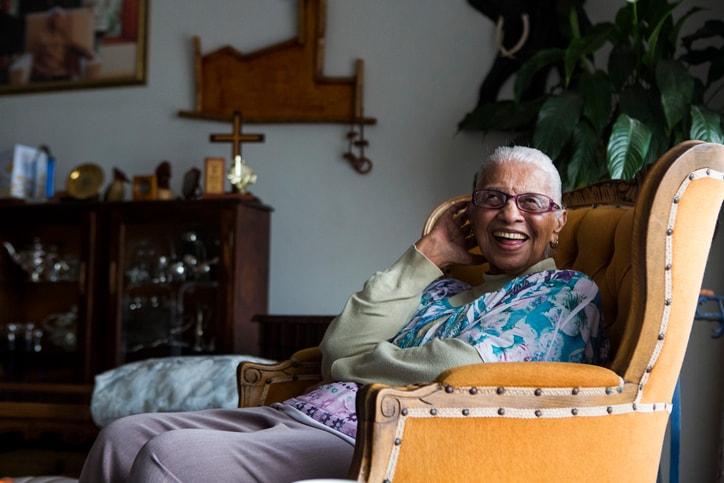By Mary Brophy Marcus
An Alzheimer’s diagnosis can come with a profound mix of emotions. It can be a huge relief to finally have an explanation for symptoms. But that can be quickly replaced by overwhelming feelings as you begin to search for more information about the disease, figure out what doctors to see and try to plan for the future.
As is the case with cancer and other complex illnesses, there are many types of providers who can help with health needs throughout the course of Alzheimer’s, so you’ll want to build a health care team for the weeks, months and years ahead. It’s a disease that has different stages, and the various medical and caregiving professionals you’ll need will evolve over time, says Beth Kallmyer, vice president of care and support for the Alzheimer’s Association.
Here’s what you need to know to put together your Alzheimer’s health care team at any stage:
Early-stage (mild) Alzheimer’s
Primary care physician (PCP): A primary care physician can help diagnose Alzheimer’s and provide a range of care moving forward, including regular checkups and medication prescriptions related and unrelated to Alzheimer’s. But be sure to see a primary care physician who has experience working with people with dementia and Alzheimer’s, advises Kallmyer.
If you start out with your PCP but don’t like the care you’re getting, try finding one with Alzheimer’s expertise using the Alzheimer’s Association’s Community Resource Finder.
Geriatrician: An alternative to a PCP, a geriatrician is basically a primary care doctor who specializes in treating older people — similar to the way a pediatrician specializes in caring for children. Finding one may be tough, though, since they’re in short supply, and wait times to get an appointment may be longer, says Kallmyer. Academic medical centers can be a good place to start.
Early stage support groups: It can help to talk about your Alzheimer’s diagnosis with someone else who’s going through the same thing. Individuals and their families can connect with others in the same boat by contacting one of the Alzheimer’s Association’s local chapters. Many have regular meet-ups and sponsor group activities, such as art museum visits and other cultural event outings. Local support groups are also a great way to learn more about nearby services, such as Alzheimer’s day care programs and classes.
Research participation: While not a healthcare provider, participating in a research study is a way to access (free) care and become part of the effort to better understand and find new treatments and cures for the disease. The Alzheimer’s Association TrialMatch is a free clinical studies matching service that generates customized lists of studies based on user-provided information. Regular medical check-ups and other health services are often provided to study participants free of charge.
Alzheimer’s Disease Research Centers: NIH’s National Institute on Aging (NIA) funds Alzheimer’s Disease Centers (ADCs) at major medical institutions across the United States. NIA offers a list of 35 Alzheimer’s Disease Research Centers. People can contact a center if they’re interested in obtaining diagnosis help, medical management services, information about the disease, support resources or if they are looking for opportunities to participate in studies.
Middle-stage (moderate) Alzheimer’s
Neurologist: Sometimes a primary care physician will recommend a neurologist visit. This is a doctor who specializes in treating issues related to the brain and nervous system. Look for a neurologist with specific experience in memory issues and dementia, Kallmyer recommends, because some don’t focus on this area of medicine. Neurologists can also prescribe more specialized tests and treatments if need be.
Aging life care manager: Their backgrounds can vary, but usually an aging life care manager is a licensed nurse or social worker who specializes in geriatrics. The National Institute on Aging describes them as a sort of “professional relative.” They can help identify needs and find ways to meet them, including short- and long-term care planning, home safety assessments and addressing emotional needs and support of both patients and caregivers. Aging life care managers generally charge by the hour, and most insurance plans don’t cover the cost; Medicare doesn’t cover it either. So you may need to pay for this service out of pocket. However, if your PCP’s practice has a care manager on staff, you may be able to get some coverage as part of your general medical care.
Adult day care programs: These are local programs that give people the opportunity to be social and take part in art, music and other activities in a safe environment. They can also offer a much-needed break for caregivers and often provide health services such as insulin shots, medication dosing, eye exams and more. The Alzheimer’s Association’s Community Resource Finder can help you locate a day care program near you.
Geriatric psychiatrist: If a person is having behavioral issues — they can’t calm down or their anger is unmanageable — a geriatric psychiatrist is a good option for counseling and medication support. They can also be located using the Alzheimer’s Association’s Community Resource Finder. “They understand that depression and frustration are normal reactions to changes in the brain for some folks. But not everyone will need to see a psychiatrist,” says Kallmyer.
Physical and occupational therapists: These trained health care providers tend to be most helpful in the middle stages of Alzheimer’s, when a person’s functioning may be more impaired but not gone. They can help maximize a person’s ability to engage in activities, promote safety and focus on comfort. For example, an occupational therapist can help figure out what communication strategies work best at this stage; a sign with large type instructions may help someone with Alzheimer’s use a microwave or other household appliance better than verbal instructions. A physical therapist may help someone modify a lifelong exercise program that’s become too challenging.
Late-stage (severe) Alzheimer’s
Nutritionist: It’s not uncommon for people with later-stage Alzheimer’s to forget to eat. They may also have difficulty using utensils and swallowing. A nutritionist can help you find creative ways to make sure eating is easier, such as making nutritious smoothies and shakes, how to avoid salt and high fat foods, and supplements that may boost nutrition. Look for a nutrition expert who is a registered dietitian (RD) or a registered dietitian nutritionist (RDN). Your PCP or geriatrician can recommend names in your area, or an academic medical center or reputable hospital system is a good place to to start. And ask if they’ve worked with people with dementia — they’ll better understand unique issues in this group, such as a decreased sense of taste and smell, and the risk of dehydration and weight loss that can occur when someone forgets to eat due to memory loss.
Skilled nurse or companion in-home care: “The reality is that even if you’re taking care of someone at home, you can’t be by their side 24/7. You have to take a shower, go to the bathroom, let the dog out, and you may be trying to manage a work schedule,” says Kallmyer. A nurse or companion who has experience with dementia can help bathe and feed a person with late-stage Alzheimer’s, and their presence can even help reduce the odds of a fall or other accident. There are many national and local businesses that provide these services, or you can search on Care.com.
Nursing homes and skilled nursing facilities: A nursing facility can offer support for acute care needs (for example, after a fall or heart attack) as well as long-term care. Many assisted living facilities, nursing homes, and nursing facilities also have special care units for people with Alzheimer’s/dementia. They may be called memory care or dementia care units.
Palliative care: Palliative care focuses on comfort and quality of life for people with serious, chronic and life-threatening disease. For people with Alzheimer’s, finding good palliative care can be challenging. Studies show people with dementia are less likely to be referred to palliative care teams, are prescribed fewer palliative care medications, are infrequently referred to care and may be denied access to care. Enlist the help of your doctor and care team, including your aging life care manager, to be sure palliative care services are in place should the need arise.
Hospice: Hospice care focuses on comfort and dignity at the end of life. “It used to be that hospice care was for cancer, but that’s really changed over last several years,” says Kallmyer. Your hospice care team may include your doctors, nurses, home health aides, social workers, counselors, clergy, family members and volunteers. They can help with pain management, medical care and equipment, grief support, respite care for caregivers, even making family meals and cleaning.





